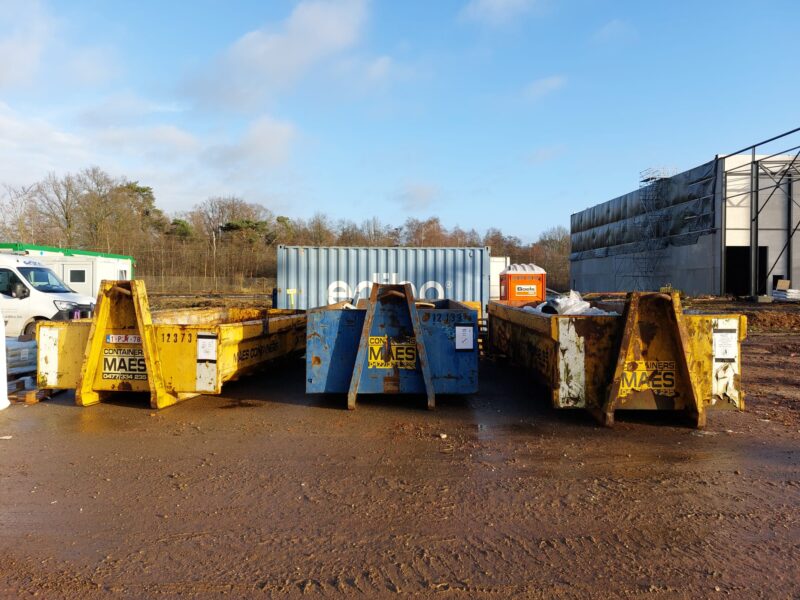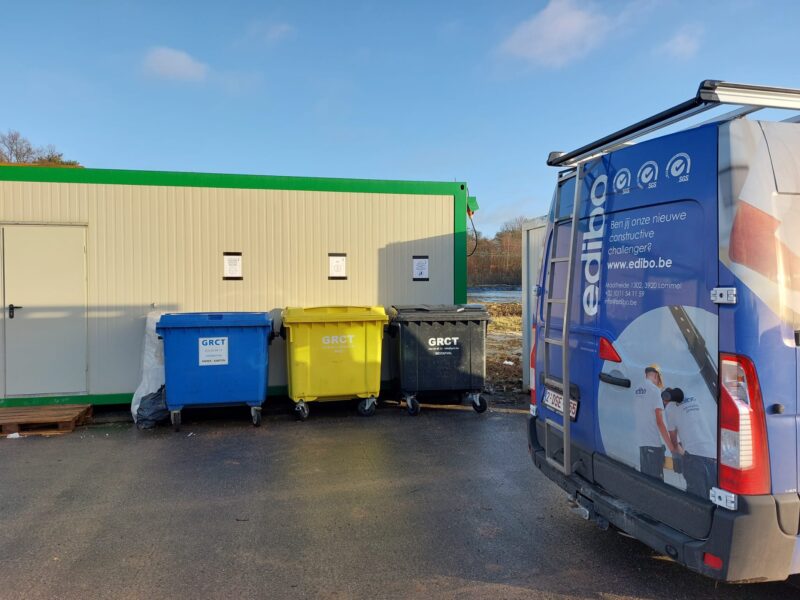More than ever, the past few years have been focused around a durable and ecological edibo construction policy, on and around our construction sites. This resulted in a variety of concrete initiatives, including among others the optimisation of our waste management. Thomas Van Hooydonk, our Safety, Quality and Environment Coordinator accentuates the current and future interests of an advanced waste process, for edibo as well as for the construction industry as a whole.
SDG Pioneership as a solid foundation
Since October 2023, edibo has been an SDG Pioneer for three years. This is the result of an intensive sustainability trajectory in scope of the Charter Sustainable Entrepreneurship by VOKA (the Chamber of Commerce).
“For three years, we have been launching at least 15 initiatives throughout our organisation in light of the Sustainable Development Goals specified by the United Nations. These sustainability goals can be categorised into the so-called 5 Ps: People, Prosperity, Peace, Planet and Partnership”, clarifies Thomas Van Hooydonk.
“During this course, we also obtained the environmental management standard ISO 14001. One important aspect was improving our waste management. Thanks to the support of the external department Mensura, we managed to progress relatively quickly.”
“The benefits of an optimised waste policy cannot be denied. First of all, a safe and clean site is a kind of calling card not only for your co-workers, but for your building partners as well. Secondly, the financial component cannot be ignored. Throwing every type of building waste into the same skip might save time, it doesn’t save costs. It takes a lot of money and organisation to separate that waste afterwards.”
New insights, new standards
What does waste management in practice look like today at edibo? “Thanks to an external waste audit performed by Waste2Profit we were able to map the different waste flows of our sites and our Lommel headquarters. This taught us which questions to ask and it showed us the insights we needed to determine new standards.”
“Today, we systematically separate our waste flow on site by using a multitude of skips. These are almost like small waste streets. However, not every site generates the same type or the same quantities of waste. Therefore, we have determined a standard: on which sites can we apply this standard and where do we need to install additional waste facilities? It is the task of each project team to assess and monitor this entire process as accurately as possible. It quickly became clear that our own construction site teams were on board. The next step is engaging our subcontractors, with or without a language barrier. Sustainable waste management should have its own universal language and that is something we are working hard on to achieve, for example by incorporating waste signs in multiple site languages.”
“Then again, it goes a lot further than the pure sorting game. For instance, how do we avoid lost bolts, screws, flashings and other materials from becoming unintended waste instead of usable spares? How do we make more people aware of the existence of the deposit money on pallets and other recuperable materials? Maybe our waste could serve as raw material for other activities?”

Up next: a dedicated sustainability coordinator
“We’ve got our work cut out for us. The sustainability aspect has never had a more central position in the construction industry. Meticulous monitoring of waste flows and their environmental impact, during and after the construction process is more often than not the norm. Consider BREEAM certified construction projects, compulsory life-cycle assessments in the allocation phase of a project, increasing circular building requirements …”
“Another challenge: how do we make sure that not only building materials are optimally reused in the future – when demolishing the old D’Ieteren buildings we reused no less than 90% of the building materials – but that at the same time the value of these materials degenerates as little as possible?”
“Those are the challenges we will be working hard at, now and in future. Starting with employing a full-time sustainability coordinator. A professional who can focus 110% on two main aspects: further developing edibo as a sustainable organisation and secondly, counselling clients in building sustainable buildings. In light of the new CSRD legislation and the accompanying reporting requirements as of 2025, they will be a welcome ally to our building partners. And we as a company will further cement our role as sustainability pioneer.”
What is the reach of your sustainable building ambitions?
It is clear that at edibo we do not disguise that we want to and can move further in the field of sustainability. This reflection starts a lot sooner than when the first building machinery is sent to the site. This way, your future buildings will radiate unpolluted sustainability; today, tomorrow and the day after.
Contact us with all your questions, queries and ambitions. We would gladly sit with you for a first non-binding meeting. In the meantime, take a look at our numerous realisations across industries.
